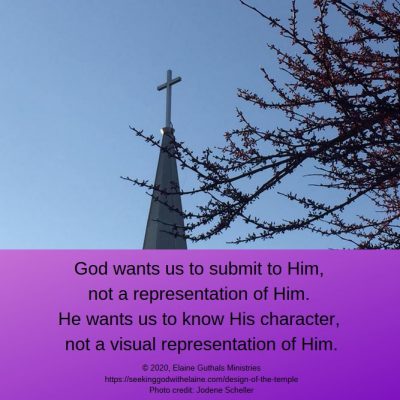Nuggets
- We were designed to worship God, which takes faith.
- Disciples aren’t perfect, but God uses us anyway — to great success.
- We aren’t supposed to worship idols — we are to worship God and learn of His character.
- When we believe in and submit to Him, God will provide for our needs.

We like to say the church is not a building – it is a people. That is how God sees us. This devotion looks at how people of faith were designed to worship the One true God.
We have been using a really good sermon by Baker as the foundation of this series. It will mostly provide headings and some verses.
Baker did tie this section to the previous ones. He wrote, “Then it appears from what has been said, that God is the builder, Christ the foundation, and believers are the materials of this temple.”
Let's Put It into Context
Church, according to the Holman Bible Dictionary, is “the term used in the New Testament most frequently to describe a group of persons professing trust in Jesus Christ, meeting together to worship Him, and seeking to enlist others to become His followers.”
The door of entrance is faith in Christ (Hebrews 11:6)
“Now without faith it is impossible to please God, since the one who draws near to him must believe that he exists and that he rewards those who seek him” (Heb. 11: 6 CSB)
We were designed to worship God. To do that, we have to have faith. Faith is the belief that the doctrines stated in God’s Word are true, even if we do not understand all aspects of them and they are not self-evident.
We’ve talked about this verse a couple of times. Let’s recap.
- We’ve got to believe He exists, so He is there for us to seek (Why Should We Seek God?).
- The foundation of salvation is belief. That has components of faith, access, and reward (Belief: The First Step in Salvation).
- The first aspect is our comprehension of the subject. It starts with knowledge. We have to know the evidence presented and believe it to be true (Belief: The First Step in Salvation).
- Our faith is limited to our understanding. And let’s be realistic here. There is much that is beyond our understanding (Belief: The First Step in Salvation).
- We have to have faith to please God (Why Should We Seek God?).
- Because our understanding is limited, the second aspect is we have to trust God in what we don’t understand (Belief: The First Step in Salvation).
- Scriptures also give us evidence to support faith (Belief: The First Step in Salvation).
- Because we have faith, we seek God (Belief: The First Step in Salvation).
- We have to have faith that, as we ask in prayer, God will reward us (Belief: The First Step in Salvation).
- He will reward those who seek Him — no qualifications – but it may not be what we are expecting (Why Should We Seek God?).
To read a related devotion, click the button below.
Our sinful nature makes that comprehension process harder. Noel reminded us that sin deadens our ability to identify spiritual things.
Let’s roost on comprehension a minute. To comprehend, we have to have knowledge. To have knowledge, we have to seek God — hear His Word, read it, study it, meditate on it, and memorize it. All through that, we need to be in prayer, asking God to provide the meaning.
Searching for and Seeking God
Hearing His Word (Rom. 10: 17).
Reading His Word (Rev. 1: 3).
Praying to Him (Heb. 4: 16).
Studying His Word (Ac. 17: 11).
Meditating on His Word (Ps. 1: 1-2).
Memorizing His Word (Ps. 119: 11).
But what do we do? “Oh, I’ll read this if it only takes me a minute. Otherwise, I will skim it. I am not going to open my Bible to check anything out. I am not going to think about what is written unless something hits me. I am most definitely not going to think about how it applies to my life.”
We want to just read what is before us so we can say we’ve spent our time with God today.
Ministers of the gospel are pillars (Galatians 2:9)
“When James, Cephas, and John — those recognized as pillars —acknowledged the grace that had been given to me, they gave the right hand of fellowship to me and Barnabas, agreeing that we should go to the Gentiles and they to the circumcised” (Gal. 2: 9 CSB)
This verse doesn’t mean anything if we don’t know who James, Cephas, and John were.
James was Jesus’ brother. Although he didn’t believe while Jesus was alive, he was converted after the resurrection. He became the leader of the Jews in Jerusalem. James was known for his cool temperament. Robinson identified James as a careful person.
Cephas is another of Peter’s names. A fisherman by trade, Peter’s faith was so strong that Jesus called him a rock (Mt. 16:18). He was the only disciple brave enough to jump out of the boat in Matthew 14: 28-31. Peter was impulsive yet sincere. Still, Peter was the unspoken leader of the Apostles.
To read a related devotion, click on the appropriate button below.
Also a fisherman, John was the beloved disciple. He was the only one to not become a martyr. He wrote the Gospel of John, three letters, and Revelation. Robinson said that “John was of all the best calculated to labour for spiritual eminence in the converts.” John assumed the care of Mary after Jesus’ crucifixion.
Conybeare and Howson pointed out that John hadn’t contributed much to the discussion. Only at the end did he show his unity with Paul. They wrote that James, Peter, and John “… stand among the pillars of the Holy Temple; and the Church of God is thankful to learn how contemplation may be united with action, and faith with love in the spiritual life.”
What we can take away from these men’s lives is they weren’t perfect. They knew their share of failures. They probably wouldn’t have been chosen by the world’s standards.
God used them anyway — to great success.
These men had the strength of faith to go from being obscure, unknown, common men to the leaders of the new church.
You see, God will do that. He uses broken people so His healing power can shine through.
The ordinances are its windows (Exodus 20:24)
“Do not make an idol for yourself, whether in the shape of anything in the heavens above or on the earth below or in the waters under the earth” (Ex. 20: 4 CSB)
According to the Holman Bible Dictionary, an idol is a “physical or material image or form representing a reality or being considered divine and thus an object of worship.” Woods noted that the problem was the symbols became the objects of the devotion.
Bradley wrote that idolatry is “a giving to something below God of that worship which is due to God alone. It may be outward, or inward; an act of the body, or an act of the mind.” He also cautioned us that idols can take over our lives.
You have to remember their history. The Wilderness Wanderers has come out of Egypt. Egyptian religions utilized symbolism.
They were going to Canaan. Canaan had many who worshiped falsely gods.
Woods argued that, while material images were not okay, mental images based on God’s prior revelations were. The culmination of these revelations were Jesus, who took a human form.
God wants us to submit to Him, not a representation of Him. He wants us to know His character, not a visual representation of Him.

Boardman put it this way. He wrote, “We must worship God according to His nature; His nature is spiritual, and, therefore, we must worship Him spiritually — spirit-wise, not image-wise; for only what is spiritual in us can worship what is spiritual above us.”
Its provisions are large and entertaining (Psalm 132:15)
“I will abundantly bless its food; I will satisfy its needy with bread” (Ps. 132: 15 CSB)
Okay. A couple of days ago, I shared a meme on my personal Facebook page. It said the membership qualifications for being a Baptist were believing in Jesus and owning a 9 x 13 casserole dish.
Yes, Baptists love their pot lucks.
But we are just sharing of the bounty that God has given us. When we believe in and submit to Him, God will provide for our needs.
Young reminded us that God “… knows every circumstance relative to her [the church] and to every one of her members; [He] is ready to hear all the requests of His people, and to grant them without loss of time.”
Making the Connections
Okay. So where do we go from here? Let’s try bullets.
We were designed to worship God, which takes faith.
Disciples aren’t perfect, but God uses us anyway — to great success.
We aren’t supposed to worship idols — we are to worship God and learn of His character.
When we believe in and submit to Him, God will provide for our needs.
God alone should be praised. God alone should be worshiped.
Making the Connections to Self-Discipline
Worldview people generally do not see, if there is a God that created us, why we need to submit to Him. How would you explain the faith needed to worship God, and not the idols present in this world?
We’ve been asking these questions all along so we can prepare for when we are asked. Here is the worksheet again. What would you say about being perfect?
- What does the Scriptures say?
- What do I believe?
- Why do I believe the same/differently than the Scriptures?
- What are the talking points when witnessing to a non-believer?
Related Links
I have created a worksheet of the questions above. Click on the button below to access it.
How Do We Apply This?
If we have not believed in and submitted our lives to the One true God, we need to do so.
The ABCDs of Salvation
If you have not become a believer in Christ, please read through the
Plan of Salvation and prayerfully consider what God is asking you to do.
A – admit our sins
B – believe His Son Jesus is our Redeemer
C – confess God as Sovereign Lord
D – demonstrate that commitment by making any changes needed in our lives to
live the way in which God has called us
The Disciple’s Job Description
To worship God, we need to know him. To know him, we need to search for and seek him.
Being a member of God’s church is about praising our Creator. We are to live our lives so that we imitate Him. We are to submit to His sovereignty.
Father. We are humbled that You not only designed a way for our relationships with You to be restored, but also You use us to expand Your kingdom. Thank You for making us You church. Grow us so that we may have Your character. Amen.
What do you think?
Leave me a comment below (about this or anything else) or head over to my Facebook group for some interactive discussion.
If you don’t understand something and would like further clarification, please contact me.
If you have not signed up for the email daily or weekly providing the link to the devotions and the newsletter, do so below.
If God has used this devotion to speak with you, consider sharing it on social media.